Regional call to decriminalise suicide: MindWise Project sees hope for the future
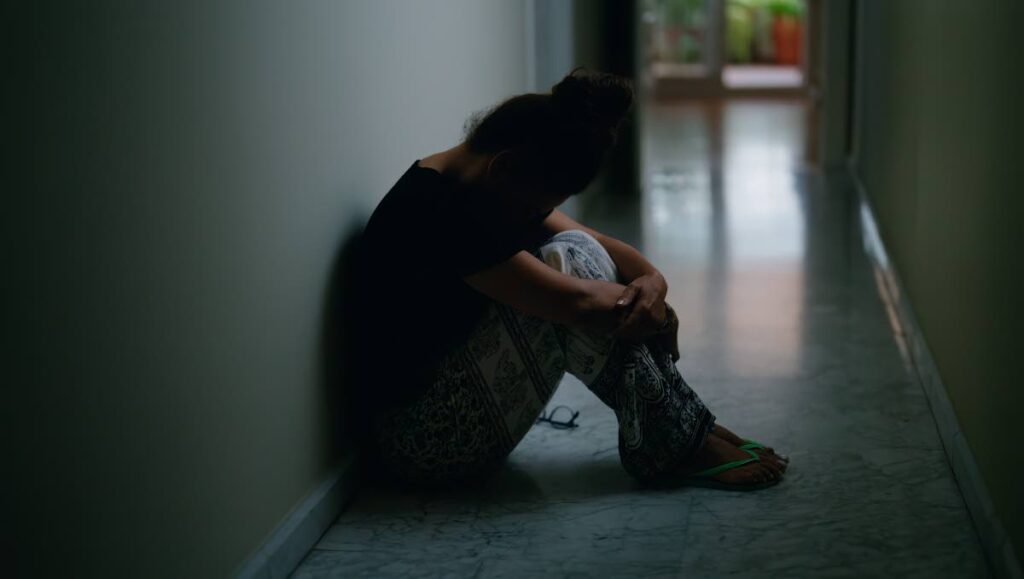
MARIA O’BRIEN, a director at MindWise Project, says there needs to be more public programmes that give people options and hope for the future if TT is to arrest the cases of suicide.
MindWise, an NGO working at improving access to mental health resources in TT, is one of the partners of the Caribbean Regional Coalition for the Decriminalisation of Suicide, which is advocating for decriminalising suicide and replacing the legislation with suicide prevention amendments.
Statistics from the TT Police Service for January 2016-August 2023 showed confirmed suicides peaked during the pandemic, increasing from an average of 96 from 2016-2020, to 128 in 2021 and 142 in 2022.
As has been the case globally for decades, rates for males were much higher than for females. While the number of cases for females were 19, 18 and 19 for 2020, 2021 and 2022, the corresponding numbers for males were 85, 110 and 123.
The dominant age group for suicide was 60 years and older, with 144 people, and the second highest was 91 in the 35-39 age group. However, those in the 15-19 age range made the most attempts – 65.
The data also showed people of East Indian descent consistently had the highest annual rate, resulting in a total of 517 deaths by suicide during that period. The second highest rate was 237, by those of African descent.
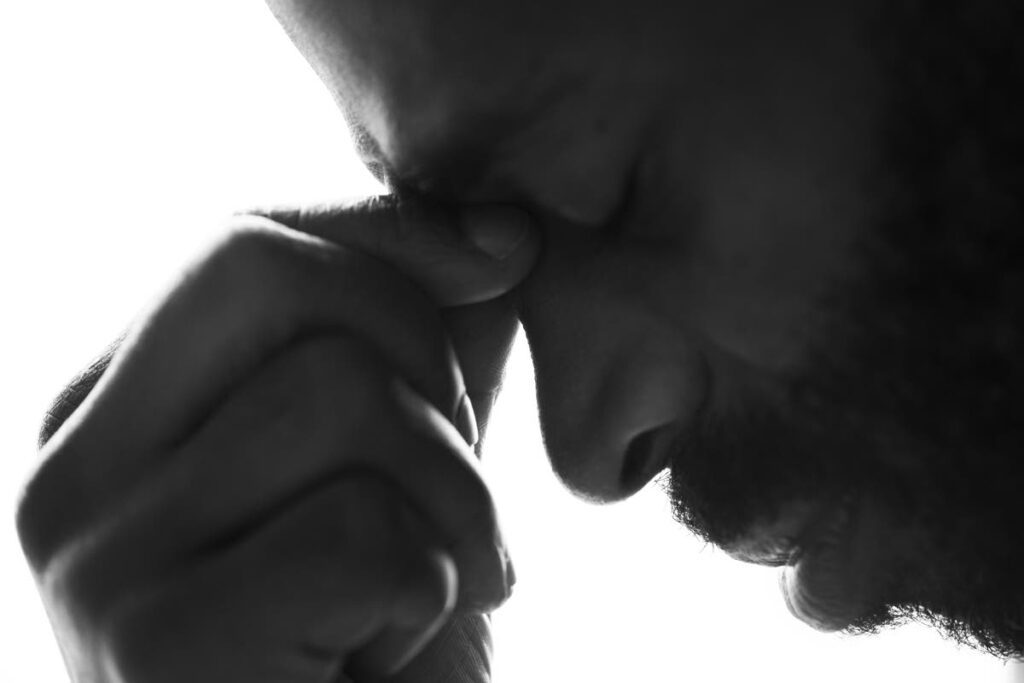
O’Brien said according to MindWise records, there have been seven female and 40 male suicides for 2024 up to August. The youngest was 15. She said in 2023 there were 154 suicides, the highest number since 2004 which was 115. But, so far, the trend for 2024 suggests the lowest suicide rate in the last 20 years.
“We never really know why people take their lives. It’s a very personal thing. Even if they write a note, you don’t know what really leads up to that specific decision to complete the act.
“So if suicide takes place when pain exceeds resources for coping with pain, then we just need more resources. We have to provide a sense of self-love and belief that your future matters.”
Addressing the various trends she said last year, many of the suicides in adolescents and young adults took place between July and September, around the time of exam results and the start of the school year/semester.
“We’re talking about that pressure, that weight experienced by that generation that went through covid – going back to school, the impact that had on them, the expectations of going back to normal. I think young people were going through quite a lot.
“And I also think, unfortunately, the way things are structured in TT, we don’t really offer a lot of other pathways. TT has a very traditional idea of success – you’re either excellent (in academics) and you’re going to do great in life, or you don’t succeed in school and you’re a failure.
“So young people have that lens on how they look at themselves and perceive their worth. It’s around the concept that they are a burden or are not adding any value to the people in their lives.”
In the case of the elderly, she said in her experience, many feel isolated or are not connecting with others. They feel powerless or hopeless to change things in their lives. They may have financial problems, chronic pain or other health issues, and feel they do not have much to look forward to.
She said some call helplines just to talk to someone and it makes them feel connected. So she believes it is important to create better programmes which create a sense of community for the elderly.
More mental health programmes designed by men for men are also needed, as men have a great burden of expectation, and unmet expectations can lead to a downward spiral of emotions.
Addressing the fact that East Indians accounted for about 63 per cent of suicide cases in the country, O’Brien stressed it was not a genetic disposition.
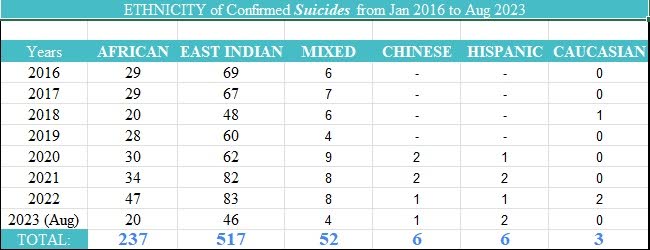
“Because of the work that I do and my personal lived experience, I know suicide is surrounded by many factors – cultural, individual, financial and so on. And cultural factors play a huge role in a person’s mental health and how they perceive it.”
She said as someone of Indian and Chinese descent, she realised people of Asian cultures in general do not talk about their problems or feelings. Then there is the TT “grin and bear it” culture where people prefer to use food, alcohol and liming as a coping mechanism rather than actual therapy.
She added that there was a “ripple effect” to suicide and suggested if someone took their life, the five-seven people closest to them should be on suicide watch. She said the sense of hopelessness is almost catching and can pervade them. So if suicides happen in certain areas, the numbers can be compounded in the following years.
“The more a community is exposed to suicide, the more at risk that community is, especially if there isn’t an increase in the community’s resilience to suicide and crises.”
She said globally, significant work has been done in suicide prevention because of the high rates during the pandemic. It showed people were not resilient to crisis and people had to stop and take notice. As a result, there are a lot more public programmes on suicide prevention.
Making help more accessible
The Caribbean Regional Coalition for the Decriminalisation of Suicide was launched in June and includes regional central statistical offices, mental health advocates, policymakers and other key stakeholders from the Caribbean.
Reseda Ramkhelawan, who is also a member of MindWise and the coalition, said during the pandemic there were elevated levels of suicides and suicide attempts. It is speculated that the level of suicide ideation, or having suicidal thoughts, were at an “all-time high” and the intrusive thoughts won out because they were isolated and did not have external support.
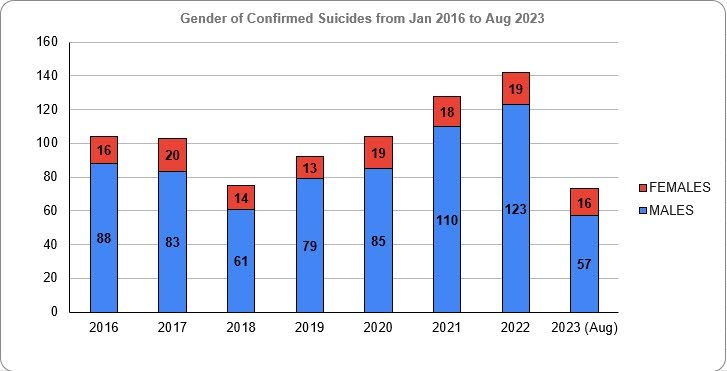
As September is Suicide Prevention Month, the coalition hopes to increase the visibility of mental health concerns and issues so people could access available help. She said having more awareness about why they are feeling the way they are could give them a deeper understanding of themselves.
So MindWise and Let’s Unpack It, a youth-led organisation in Barbados which aims to empower Caribbean youth to beat the stigma surrounding mental health, share graphics and videos, as well as contact information for help on social media.
The coalition is also working with partners in the Caribbean and United for Global Mental Health to create a plan to decriminalise suicide in the Caribbean. Grenada, St Lucia, the Bahamas and TT are among the 23 countries worldwide where suicide is illegal.
Ramkhelawan said the outdated legislation criminalises people in crises and perpetuates stigma and discrimination, which stops some from seeking help when they need it most.
“Many countries still have it as a crime on the books. We are taking inspiration from Guyana, which decriminalised suicide, in order to advocate for legislative reform and raise awareness about the importance of reducing barriers to seeking help.
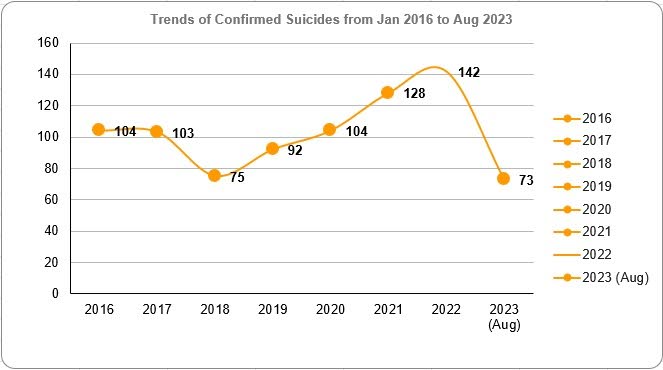
“We want to ensure persons are able to have access to crisis support lines and mental health services, and these services can operate without fear of legal repercussions and so save lives.”
She said decriminalisation was an important step to implementing effective, country-specific suicide prevention strategies.
In addition, the coalition has plans to send representatives to conferences like the Commonwealth Heads of Government Meeting in October and the International Association for Suicide Prevention’s Pan-American Conference in November, to let people know about the coalition, its efforts and to share what is happening in TT.
Available help
If you have thoughts of self-harm, there are places dedicated to helping walk you through that moment of despair.
For children, there is Childline 800-4321, or dialling 131 for its hotline, and the Children’s Authority at 627-0748, 623-7555, or 996.
Anyone who needs help can call Lifeline (24-hour hotline) at 800-5588, 231-2824, 220-3636 and in cases of emergency (attempted suicide), people can call 990, 811 or 999.
Other avenues include: Families in Action 628-2333, Ministry of Social Development 800-COPE, and the National Family Services Division 624-8218/627-1163.
Some warning signs of suicide include mood changes, saying goodbye to close friends and family and giving away possessions, feeling hopeless and like a burden to others and talking about suicide.

Comments
"Regional call to decriminalise suicide: MindWise Project sees hope for the future"